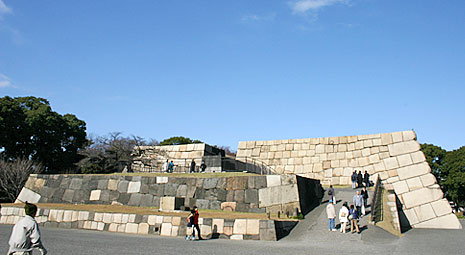EDO (EH-doh)
Former
name of Tokyo
Common clues: Tokyo,
formerly; Tokyo, once; Shogun's capital; Old Tokyo; Tokyo before
1868; Fishing village that became Tokyo; 19th-century samurai
home
Crossword
puzzle frequency:
5 times a year
Frequency
in English language:
56319 / 86800
Video: Edo
Castle Ruins
Even monkeys fall from trees ~ Japanese proverb
Edo, once also spelled Yedo or Yeddo, is the former name of the Japanese capital Tokyo. The pronunciation is "eh-doh." While there had been early settlements on the hills at Tokyo Bay for several centuries, the first major event in the history of Edo was the building of the Edo Castle in 1457 by Ota Dokan.

Stone
foundation of the main tower at Edo Castle.
The Tokugawa shogunate was established in 1603 with Edo as its seat of government (de facto capital). (The emperor's residence, and formal capital, remained in Kyoto, that city had been the actual capital of Japan until that time.)
Edo was devastated repeatedly by fires, the Meireki no Taika of 1657 perhaps having been the most serious one: an estimated 100,000 people perished in the flames. During the Edo period, there were about one hundred fires, typically caused by accidents when the mostly wooden townhouses (Machiya) were heated with charcoal fires in winter.
In 1868, when the shogunate came to an end, the city was renamed "Tokyo" which means "Eastern Capital"; during the restoration, the emperor moved to Tokyo, making the city the formal as well as de facto capital of Japan.
During the Edo period, the Shogunate appointed administrators (machi bugyo) to oversee the government of Edo. They oversaw the police and (from the time of Yoshimune onward) the commoner fire department (machibikeshi), heard criminal and civil suits, and performed other administrative functions necessary in a city of a million inhabitants.
This article is licensed under the GNU Free Documentation License. It uses material from the Wikipedia article "Edo".
|
|